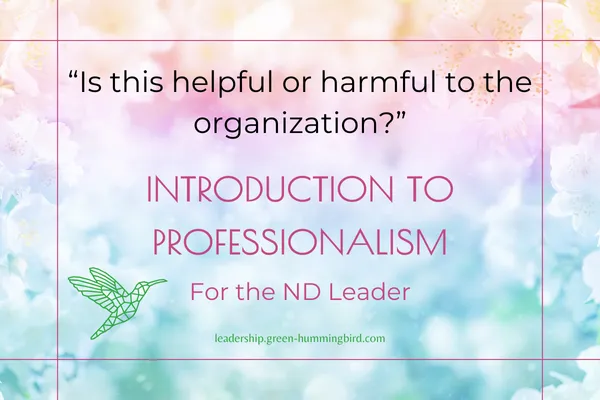
Introduction to Professionalism for ND Leaders
Theme: Management
Concept: Professionalism
Introduction to Professionalism for ND Leaders
I’m going to be honest. This one hurts a little bit, in my soul, to write about. I have had it used against me in so many different ways at different times that the word has nearly lost all meaning.
As I was just starting out in my career journey, I kept being told that I needed to “be more professional.” It was the only critique that they could come up with for me in my annual performance reviews (in at least two different workplaces), because I was doing the job itself really well. No notes on that. But when I pressed for more details, to better understand what they meant by “be more professional,” they could not give me any. It was frustrating, to say the least, since I was pretty sure they were paying me to be there, so it’s not like I was maintaining my amateur status for the Olympics. And hearing this multiple times, from multiple people, with no further explanation as to what I was doing wrong or how I could BE more professional got really disheartening. It felt more like damaging criticism than helpful critique.
Years later, I finally realized when speaking with another ND entrepreneur, that what they probably really meant was, “be less weird” or “be more normal.” Whoops. Well, that wasn’t going to happen (hello, autism), and knowing what I know now, I realize that it would have been unprofessional of THEM to explain further (and borderline discriminatory).
This term, as it is mostly used in workplaces today, bothers me because it is used as a catch-all for anything about your performance or behavior that they can’t or don’t want to say directly. That’s not what it should be.
This is why I’ve created a whole course about it, because the way it is used in neurotypical society covers a whole array of possible things you may have said, done, looked, or even just had someone else say you’ve done. It’s a veritable minefield for those of us who don’t know the unspoken rules.
In my course, I define what professionalism isn’t, and then what it is. Because it’s not just the dictionary definitions when it’s being used against you. Or maybe it is, if you look at it a certain way, but the definitions leave something to be desired. In my course, I define professionalism as how one presents and conducts themselves while representing a workplace or organization. And more specifically, professionalism is how you are expected to look and act while on the clock and in spaces where it is known where you are employed, keeping in mind that what you do and say reflects upon your workplace.
The hope is that it will keep both you and your organization out of trouble for whatever you might say or do. In today’s internet culture, making public mistakes can very well lead you to losing your job, and potentially becoming unemployable for a time, if the mistake is bad enough and reflects badly on your employers for continuing to work with you.
Examples of Unprofessional Behavior (by both worker and leader)
Over the years, basically until I stepped into a leadership position at my job, I was frequently told that I needed to be more professional, without clarification as to what they meant. Sometimes their comments were justified. I made mistakes, and I was still learning and growing into my own as a worker and a leader. Sometimes it was regarding how I reacted to things, because my reactions were not what was expected (typically, I was either too emotional, or not emotional enough). So I hadn’t gotten good enough at masking.
Sometimes I made inappropriate comments in an attempt at humor in situations that did not call for humor. But I was uncomfortable, with the situation and my own feelings regarding it, and humor was my go-to defense mechanism. That had worked for me in most workplaces and social situations, until that one.
Sometimes, the complaints about my lack of professional behavior were based on rumors that were reported to my bosses, and my bosses had their mind made up about the situation before even consulting me about said rumors. So when I tried to stand up for myself and explain that wasn’t what happened, it came across as defensive, and something that needed to be shut down.
But most of the time, looking back, what they were complaining about was either a direct result of lack of training or explanation, or their perception that I was just too “weird,” which was probably because of my AuDHD.
All this time I was being chastised for poor professional choices, I was also watching as my bosses made worse ones.
Like the time a manager (3 levels above me, whom I rarely saw) was giving a tour of our facility to out-of-state partners, and was joking around with me and them, when he suddenly switched to coaching me for something I did that was against a different department’s rules, but I had no choice in according to the company’s rules and was told to do so at the time by my direct boss. I thought he was still joking at first, until he pulled up picture proof of my supposed transgression and refused to listen to my explanation because we had guests.
Or the time a site director (when I worked for a tutoring company) claimed that my students were complaining that I talked to them too much during our sessions. Despite their test scores rising, and them being fully engaged in the sessions, which were still entirely on-topic (just not sitting in silence and working on worksheets the whole time). It turns out, I was not the only one to receive this exact same feedback, and it didn’t start until immediately after she had cameras installed throughout the office space.
Or the time another department’s director came into my boss’ office to yell at him for something he did or said in a director’s meeting that she didn’t like, only to find him not there, so she screamed at me, instead.
Or the time my boss gave out a friend’s personal phone number, without her permission, or even warning her that it was happening, at a networking event he attended. And then doing it again, after she specifically asked him not to do so after the first incident. He had a history of sharing our personal information without our permission, and when I had a stalker incident AT WORK, he was entirely unconcerned about it.
Or the time my boss attempted to gaslight and bully me, in a mediated meeting, to convince me to just do what he wanted and stop having a complete mental breakdown over the safety issue he was causing and not exposing himself to (I guess?), by telling me things like “everyone thinks you are being unreasonable” (as it turns out, there’s a good chance he was lying about this and/or lying to the people he was referring to), that he felt like HE was being blackmailed (because I was ready to quit over this), that he couldn’t compromise with me because it would “set a bad precedent for all future employees,” and my favorite, “I think you think you have more power than you do” (which you really only say when you feel your own power is threatened). For my part, I thought this meeting was supposed to be an attempt to compromise, until I walked into it. It became the moment I realized how toxic (not to mention unprofessional!) the organization was with that man in charge of it.
What it means for Neurodiverse folx
Besides its definition, professionalism is not something that is directly taught in schools. It may be things that trickle down to you as you get more involved in various activities throughout childhood and adolescence. Nor is it something that is usually part of the onboarding or job training you might receive when you start a new job, though you may get bits and pieces, it will not cover everything they might consider unprofessional. Since it is basically a bunch of unspoken rules, there’s a lot of contradictions in what people consider to be professional or unprofessional.
Since many of us, myself included, need to be told directly what the rules and expectations are, this concept is really hard to grasp. When what we see doesn’t jive with what we’re told, and especially what we’ve been chastised for, it breaks our brains a little bit (maybe a lot, sometimes).
For ourselves, as we are in positions of leadership, being consistent with conducting ourselves professionally helps to create a more professional organization culture, sets expectations for everyone else, and cuts down on issues we might otherwise have to spend time and energy on outside of our mission.
Tips & Tricks
There’s so many tiny, unspoken rules regarding professionalism that it’s impossible to list them all here. I probably don’t even know them all myself, after 20 years in the workforce, because it can also shift with work culture, wider culture, and who your coworkers are.
Here’s a few things to keep in mind while making any decisions in a professional capacity:
What is the safest option for everyone?
Physically
Mentally
Emotionally
Does this help or hurt the mission of the organization?
Is it kind?
True
Helpful
Honest
In part, professionalism is a matter of respect: for your organization, for your team, and for the people you serve and with whom you partner. There is so much more than that, though. And while thinking about these things when making professional choices can help you make the professional choice, much practice is needed, and it is probably faster to find some kind of rulebook to get you started. It’s such an ambiguous concept that I ended up creating an entire course about it–The Unspoken Rules: Professionalism– geared toward young neurodivergent people who are just starting out their careers. It could potentially answer questions for some who have been in the workforce awhile and are not progressing as they hoped to, as well.
In general, as a leader, the best thing you can do to be professional and encourage professionalism in your team, is to walk the walk. Don’t do anything you wouldn’t want your team members to do. Be aware of how your actions reflect on the organization and on how you expect them to conduct themselves. For example, if you’re rarely in the office, it’s hard to encourage arriving at the office regularly and on time. And if they slip up, give them specific feedback about how/why it’s a mistake, so they can avoid it in the future. Coach them to grow, not to punish. And, as always, remember to Focus on the Mission, and Be Kind.


